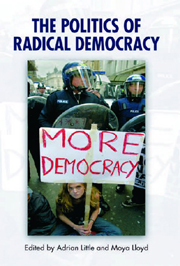Book contents
- Frontmatter
- Contents
- Acknowledgements
- Notes on the Contributors
- Introduction
- 1 Rhetoric and Radical Democratic Political Theory
- 2 Performing Radical Democracy
- 3 Aboriginal Sovereignty and the Democratic Paradox
- 4 Judith Butler, Radical Democracy and Micro-politics
- 5 Post-structuralism, Civil Society and Radical Democracy
- 6 Hegemony and Globalist Strategy
- 7 Is ‘Another World’ Possible? Laclau, Mouffe and Social Movements
- 8 Friends and Enemies, Slaves and Masters: Fanaticism, Wendell Phillips and the Limits of Agonism
- 9 The Northern Ireland Paradox
- Conclusion
- Bibliography
- Index
4 - Judith Butler, Radical Democracy and Micro-politics
Published online by Cambridge University Press: 12 September 2012
- Frontmatter
- Contents
- Acknowledgements
- Notes on the Contributors
- Introduction
- 1 Rhetoric and Radical Democratic Political Theory
- 2 Performing Radical Democracy
- 3 Aboriginal Sovereignty and the Democratic Paradox
- 4 Judith Butler, Radical Democracy and Micro-politics
- 5 Post-structuralism, Civil Society and Radical Democracy
- 6 Hegemony and Globalist Strategy
- 7 Is ‘Another World’ Possible? Laclau, Mouffe and Social Movements
- 8 Friends and Enemies, Slaves and Masters: Fanaticism, Wendell Phillips and the Limits of Agonism
- 9 The Northern Ireland Paradox
- Conclusion
- Bibliography
- Index
Summary
Introduction
If power, as Judith Butler argues, pervades the conceptual apparatus that constitutes us as subjects (see Butler 1992), determining ‘what we are, what we can be’ (2004a: 57), then this surely has implications for the way we live our everyday lives. This regulatory power that turns us into subjects also configures our political practices and the terrain where the struggle for hegemony takes place. How, though, does our political engagement connect with and transform daily social relations? Attempting to utilise Butler's ideas for such a political project proves to be an intriguing undertaking. Indeed, efforts aimed at constructing a politics which follows from Butler's influential interventions into the theory debates of the last two decades have occupied many commentators. Appropriating Butler for the project of radical democracy is an equally enthralling exercise, especially since she is not commonly associated with democratic theory or the exploration of democratic practices. Her recent work, though, articulates an explicit interest in the project of radical democracy which is now beginning to be explored in the critical literature (see Lloyd 2007a; 2007b). This essay aims to contribute to this exploration, focusing on the implications of Butler's account of radical democracy for the terrain of micro-politics. With the term micro-politics, I refer to those political practices, beyond state and civil society, which engage everyday social relations for the purpose of social transformation.
As I shall suggest in this chapter, the importance accorded to micro-political practices is central to Butler's account of radical democracy, articulated in her desire for ‘a more radically restructured world’ (2000c: 277).
- Type
- Chapter
- Information
- The Politics of Radical Democracy , pp. 73 - 91Publisher: Edinburgh University PressPrint publication year: 2008

